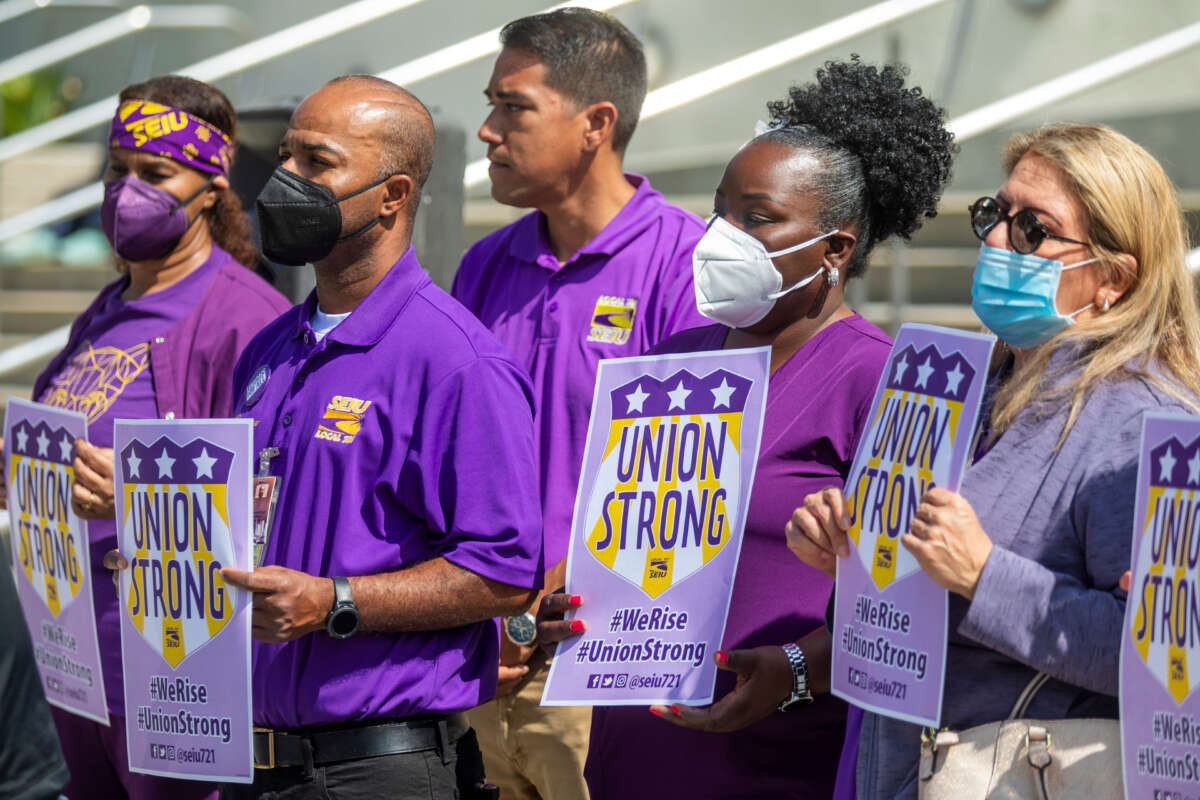More than 11,000 workers for the city of Los Angeles are joining hotel employees, Hollywood actors, and TV and movie writers who have been striking this summer for higher wages and better working conditions.
“When bosses refuse to listen to demands, workers WILL shut things down,” Mary Kay Henry, president of Service Employees International Union (SEIU), said on Twitter.
Los Angeles public employees, including sanitation workers, are participating in the one-day strike in hopes of “shut[ting]down the city of Los Angeles,” said David Green, SEIU Local 721 executive director and president. SEIU Local 721 represents more than 98,000 county and city workers across Southern California.
“The message we’re sending is that our workers are just fed up. They’ve reached a breaking point,” Green continued. “And we need these folks in the city to come back to the table for the good of the city.”
According to Green, the one-day strike comes after city officials engaged in bad faith bargaining, taking actions like sending city administrators to the bargaining table who don’t have the authorization to approve decisions and refusing to address issues like workers’ resources and major vacancies in crucial roles, which have forced workers to take huge amounts of overtime. The union plans to meet with city administrators at the bargaining table next week after sending a strong message to the city with its one-day strike.
“Despite repeated attempts by city workers to engage management in a fair bargaining process, the city has flat-out refused to honor previous agreements at the bargaining table, prompting workers to file charges alleging unfair labor practices with the city of Los Angeles Employee Relations Board,” SEIU 721 officials said in a statement.
The strike will interrupt LA City services, including trash collection, public pools, animal shelters, parking enforcement and traffic control. “We’re not trying to destroy or hurt anything,” said Gilda Valdez, chief of staff of SEIU Local 721. “But we want to send a strong message to the City of LA. Don’t come to the table and mess with us.”
This is the first strike of its kind by SEIU Local 721 in more than 40 years, and comes as hundreds of thousands of workers across the country have organized strikes and participated in what is being called “hot labor summer” by organizers.
A double strike by Hollywood’s 170,000 actors and 12,5000 writers, beginning last month, has effectively shuttered the movie and TV industry. Universal Studios responded to strikers by significantly cutting back trees that were providing shade to picketing film and TV writers during a brutal heatwave, and was fined by the city for doing so without a necessary permit.
“We’re on strike and we’re going to continue to show that we mean business so we get a fair deal until they come back to the table and actually negotiate with us,” said Deric A. Hughes, a co-executive producer on Quantum Leap who is also on the WGA Board of Directors “They can cut down all the trees. They can rip up all the sidewalks. We’ll find a way to be out here.”
Thousands of housekeepers, receptionists and cooks in Los Angeles also went on strike in July. Picketers in Santa Monica have been met with violence by hotel security guards. On August 7, Unite Here Local 11, the union representing the striking hotel workers, filed an unfair labor practice charge against Coordinated Bargaining Group, which is representing the hotels in the labor negotiations. The union has alleged that Fairmont Miramar Hotel & Bungalows in Santa Monica, Hotel Maya in Long Beach, and Marriott Laguna Cliffs Resort and Spa in Dana Point have condoned the violence against striking hotel workers.
“I think the company is trying to see us as the enemy,” German Martinez, a 63-year-old who has worked as a dishwasher at the Fairmont Miramar for 34 years, told Los Angeles Daily News. “But we’re the ones who provide service at the hotel … and we marched peacefully.”
Angry, shocked, overwhelmed? Take action: Support independent media.
We’ve borne witness to a chaotic first few months in Trump’s presidency.
Over the last months, each executive order has delivered shock and bewilderment — a core part of a strategy to make the right-wing turn feel inevitable and overwhelming. But, as organizer Sandra Avalos implored us to remember in Truthout last November, “Together, we are more powerful than Trump.”
Indeed, the Trump administration is pushing through executive orders, but — as we’ve reported at Truthout — many are in legal limbo and face court challenges from unions and civil rights groups. Efforts to quash anti-racist teaching and DEI programs are stalled by education faculty, staff, and students refusing to comply. And communities across the country are coming together to raise the alarm on ICE raids, inform neighbors of their civil rights, and protect each other in moving shows of solidarity.
It will be a long fight ahead. And as nonprofit movement media, Truthout plans to be there documenting and uplifting resistance.
As we undertake this life-sustaining work, we appeal for your support. Please, if you find value in what we do, join our community of sustainers by making a monthly or one-time gift.
